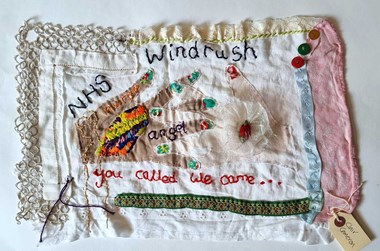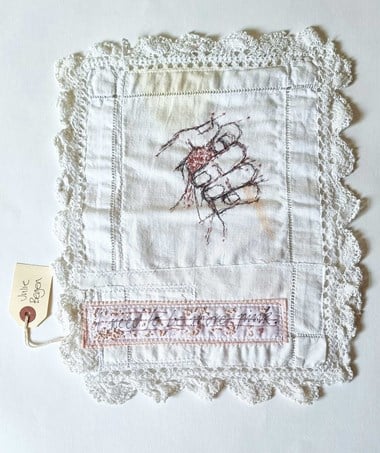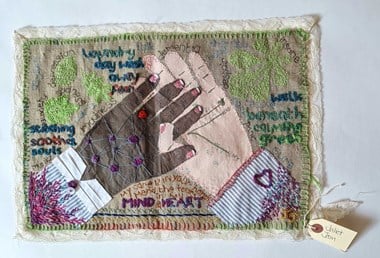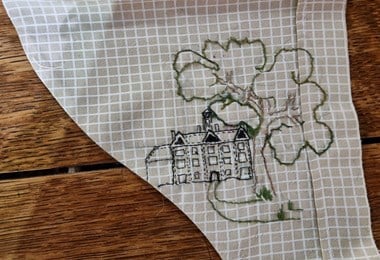Experience of England’s Nurses Captured as NHS Turns 75
Two new projects funded by Historic England’s Everyday Heritage Grants are helping to highlight the experiences of our NHS nurses through the decades.
The project Moments of Grace sees nurses who have worked at Guy’s and St Thomas’ Hospital in London, the birthplace of nursing, record accounts of their experiences before, during and after the Covid-19 pandemic, for a poignant digital exhibition to coincide with the NHS @ 75 commemorations.
Answering the Call is another project bringing the local community together to reflect on the experiences of nurses working at Glenside Hospital in Bristol. New interviews and photographs donated by nurses who worked there in the 1960s will help illuminate the experiences of those who ‘answered the call’ of the British Government for people from the Commonwealth to come to the UK to address shortfalls in the workforce in the aftermath of the Second World War.
An exhibition will see volunteers use sewing to create a tapestry of nurses’ uniforms featuring stitched quotes highlighting the experiences of nurses from the Commonwealth who came to the UK with the arrival of HMS Windrush and other ships from July 1948 onwards to work for the NHS.
More about Moments of Grace
Nurses are with us at every hour of the day and night, even when our loved ones are not able to come near. Moments of Grace focuses on this time nurses spend in hospitals and the extraordinary events, as well as the everyday rituals, they experience in their roles.
This exhibition explores time by distilling nurses’ 24-hour presence in the hospital and out in the community into a circular composition, punctuated every hour by original music composed by Nicole Robson.
Fifty modern nurses and midwives will feature in the installation, including many still working at Guy’s and St Thomas’ Hospital. It also includes accounts of nurses from the past associated with St Thomas' such as Mary Seacole, Kofoworola Abeni Pratt, Cecily Saunders, Naomi Mitchison (whose great-granddaughter is leading this project) and Florence Nightingale, represented by archive footage and performance.
There will also be a permanent 24-hour physical sound and light installation at the hospital in 2024 where audience members will be able to sit down in an elegant new alcove within Central Hall (Grade II listed) to hear NHS workers' stories, field recordings of nurses at work and original music. This will be open for the public as well as hospital staff and patients in 2024.
More about Answering the Call
Glenside Hospital in Bristol, built in 1861, provided a therapeutic community where the patients were engaged in meaningful occupations, including sewing, as part of their treatment. The hospital has had a nurse training school on-site since 1880 which is still running today.
Many of the nurses training and working at the hospital were from the Caribbean who had ‘Answered the Call’ of the British Government after the Second World War. An analysis of 320 trainee nurses from 1956 to 1966 shows 22% were from the Commonwealth, with 17% from the Caribbean islands.
Answering the Call is a co-created project, funded by Historic England and the University of Bristol, which will uncover the stories of those nurses and bring the local Bristol community together to reflect on their experiences.
Through the project, a collection of oral histories and photographs from people who worked at Glenside Hospital have been gathered together for the first time. Many stories have been captured, for example, those of May Tanner, who came by boat from Barbados and trained as a psychiatric nurse in the early 1960s. She remembers treating patients affected by the Second World War.
Many of the nurses interviewed felt their psychiatric training taught them lessons they used all their lives, as May explained: “it's taught me a lot doing psychiatry because you got then to knowing people, to get into them”.
She also describes the experience of living in Bristol: “[…] at times, the other Bristolians, they were very withdrawn from us you know. They didn't want you to touch, as though you were an alien from somewhere.”
Collaborative research showed that patients at Glenside Hospital in Bristol were often encouraged to sew as part of their therapy. Using these new oral histories and information from the hospital archives, volunteers have stitched quotes onto used nurses’ uniforms and other fabrics in the Glenside Hospital Museum collection to mark the stories and experiences of nurses who came to the UK to work in the NHS.
The project will culminate in an exhibition at Glenside Hospital Museum in December 2023, which will tour by invitation to other locations.
Sewing projects that will form part of the final exhibition
Please click on the gallery images to enlarge.
Everyday Heritage grants
These two projects are part of 57 new projects that Historic England has funded through its Everyday Heritage Grants: Celebrating Working Class Histories.
These community-led and people-focused projects all aim to further the nation’s collective understanding of the past, with a focus on heritage that links people to overlooked local historic places and celebrating working class histories.
Led by people that might not normally engage with their local heritage, these projects will support them to tell their own stories, in their own way, and to connect with others in their local communities.
These projects use community voices and creative methods to tell everyday stories of extraordinary people. They highlight the immense contribution to the NHS by those from Commonwealth countries, and the heroic work that nurses undertook during the pandemic. Both projects are moving and fitting ways to celebrate the 75th birthday of the NHS, and great examples of community-led and celebratory heritage projects as part of Historic England’s Everyday Heritage programme.









